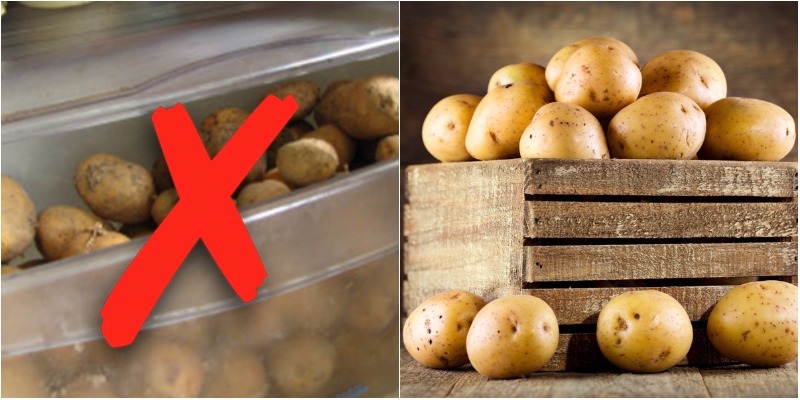Why You Shouldn’t Store Potatoes in the Fridge
According to the Food Standards Agency in the UK (FSA), potatoes are one of the foods that should not be stored in the refrigerator.
The starch in potatoes will convert to sugar if they are refrigerated, and when baked or cooked at 120 degrees, the sugar in the potatoes will produce acrylamide, which is very harmful to the health of the user.

What is Acrylamide?
Acrylamide forms when certain foods are cooked at high temperatures, and they can cause cancer in the human body.
Scientists have found acrylamide in chilled and frozen potatoes more than in other foods.

Notes on Potato Preparation
Avoid using frozen potatoes. Potatoes should be stored in a cool, dry place to prevent sprouting.
For potatoes stored at room temperature, discard those with wrinkled, shriveled skins or those that have sprouted.
For potatoes with green skins, remove the affected area before use. However, to ensure safety, it is best to avoid using potatoes with green skins.

For more information: phunutoday.vn
With this information, we hope that you will refrain from storing potatoes in the fridge. Potatoes should be peeled and used only once after preparation.
The Ultimate Guide to Food Storage: Maximizing Freshness in Your Fridge
Refrigerators are a convenient appliance for food storage, but proper care is needed to maintain their efficiency. Storing food in a refrigerator is a great way to keep it fresh, but it’s important to do it right. Join us as we explore the best practices for storing common foods in your fridge, with tips and tricks to ensure your groceries stay fresh and tasty for longer.
“Quick Fixes to Rescue an Over-Salted Soup”
Typically, when a soup is too salty, the common practice is to add more water to dilute the saltiness. However, this can often result in a bland and unappetizing soup. There are alternative ingredients that can be added to reduce the saltiness while still maintaining the flavor and taste of the soup. Join us as we explore these creative solutions to rescue your soup and make it delicious again!
The Ultimate Guide to Fluffy Egg Whites
Unveiling the secret to perfectly whipped egg whites, this introduction reveals the tricks of the trade. Learn how to master the art of adjusting egg white quantities, sugar, lemon juice, and cream of tartar, and discover the best tools to ensure a flawless, fluffy result. Get ready to impress with your newfound skills!
The Ultimate Guide to Choosing a Healthy Breakfast Cereal
When choosing a breakfast cereal, it’s important to opt for those with 100% whole grain goodness. Look for at least 5g of fiber and 3g of protein per serving, and go easy on the sugar and fat. For a healthier option, pair it with skim or low-fat milk. Always choose a reputable brand that offers quality cereals you can trust.





































